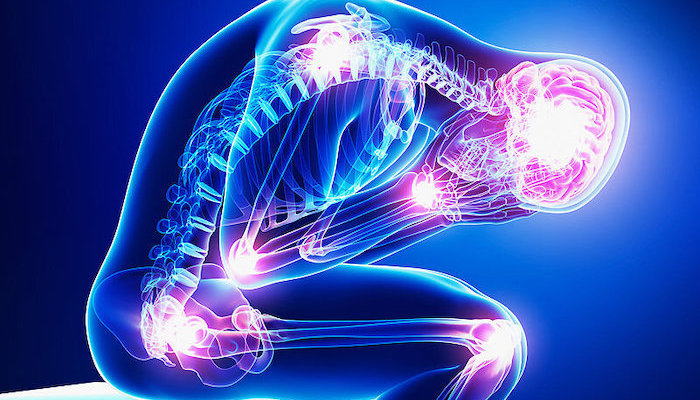
What Is Chronic Pain?
Chronic pain is pain that lasts longer than 3 to 6 months. Under the International Classification of Diseases (ICD-11) by The World Health Organization (WHO), chronic pain is defined as: “pain that persists past normal healing time and hence lacks the acute warning function of physiological nociception.” Nociception simply refers to how our bodies detect pain and send pain messages.
What Are The Symptoms Of Chronic Pain?
Each diagnosis may have different specific symptoms. Symptoms can even vary from person to person with the same diagnosis. Some general symptoms of chronic pain usually experienced include:
- Joint pain
- Muscle aches
- Reduced mobility
- Stiffness
- Lack of flexibility
- Reduced functioning
- Social withdrawal
- Fatigue
- Insomnia
- Mental illness (low mood, depression, anxiety, etc.)
- Hyperalgesia (increased sensitivity to pain)
- Allodynia (finding things painful which should not cause pain, such as a touch on your skin)
- Skin rashes and irritations
- Sensitivity to temperature/problem regulating temperature
- Cognitive problems
What Causes Chronic Pain?
Chronic pain can have a variety of causes including the following:
AN INITIAL INJURY - An initial injury may not have been treated effectively or healed properly, leading to pain persisting beyond 3 months. Even if an injury heals well, it can lead to chronic pain. You might be wondering, how is this possible? Well, acute pain is a protective defense mechanism. The brain creates pain to try and protect the body. For example, if you touch something hot, a danger message is sent to the brain. The brain then interprets the message and if it deems that protection is necessary, you’ll feel pain which in this case gets you to move your hand before you get burnt.
When you injure yourself, pain motivates you to protect the injured area. However, once the injury has healed, the nervous system may have already adapted and become accustomed to sending out those pain messages in response to certain situations, events, or stimuli and so continue to do so. Nerve pathways learn from their experiences, but they don’t always learn the right lessons. This is also known as central sensitization.
The injury could be something small such as a sprain or a fall, or something more severe such as being in a road accident or another physical trauma. Surgery can also start the cycle of chronic pain after the healing process is complete.
ILLNESS - Sometimes an illness can weaken the body and make it more susceptible to chronic pain. Some illnesses may cause an autoimmune reaction (meaning the immune system is attacking itself), causing inflammation and other symptoms which lead to chronic pain. For example, rheumatoid arthritis is an autoimmune condition that causes inflammation in the joints. This can make it hard to move the joints and cause chronic pain. Sometimes treatments for illnesses like cancer can lead to chronic pain, such as chemotherapy or radiation.
NERVE DAMAGE - Our nervous system controls every process in our body. Our nerves control the pain messages sent in reaction to outside stimuli, in order to keep us safe. When these nerves become damaged, the signals can be interrupted and incorrect pain messages can be sent out, leading to chronic pain. Nerve damage can be a result of many things including:
- Too much pressure is being put on the nerve
- An area of the body being overused and strained
- An accident
- An injury
- An illness (such as diabetes or an autoimmune disease)
- Nutritional deficiencies
- Misuse of drugs
CHEMICAL IMBALANCE - The chemicals within our brain must be balanced in order for our bodies and minds to function correctly. These chemicals are neurotransmitters. They send signals (or instructions) around the body to control our biological processes. When chemicals in the brain become imbalanced, this can lead to symptoms of chronic pain among other health problems.
For example, during prolonged stress, high levels of stress hormones are sent out. These hormones include cortisol (known as the stress hormone) and adrenaline. These hormones keep the body in a state of ‘fight or flight’, which is not designed to be endured for a long period of time. The effects of this over time (such as very tense muscles) can lead to chronic pain.
Since our brains are neuroplastic (which means they learn from what is happening in our environment) they learn and change. When the body is under a lot of stress, the brain ‘learns’ to keep sending out pain messages in response to perceived threats. The brain is trying to protect the body, even though protection is no longer needed.
Another example of chemical imbalance is low levels of serotonin, which helps to keep your mood stable as well as regulate emotions, sleep, and stress response among other functions. When serotonin levels are low, it can cause a low and unstable mood. Since our bodies and minds are connected and can influence one another, an unstable mood can have physical consequences. If a patient has depression for example, they are less likely to be active, to eat healthy meals, and to sleep well. This can lead to a decline in physical health. Inactivity can lead to deconditioning (essentially meaning lack of fitness) which can contribute to chronic pain.
Precision Pain Care and Rehabilitation has two convenient locations in Richmond Hill – Queens and New Hyde Park – Long Island. Call the Queens office at (718) 215-1888, or (516) 419-4480 for the Long Island office, to arrange an appointment with our Interventional Pain Management Specialist, Dr. Jeffrey Chacko.













